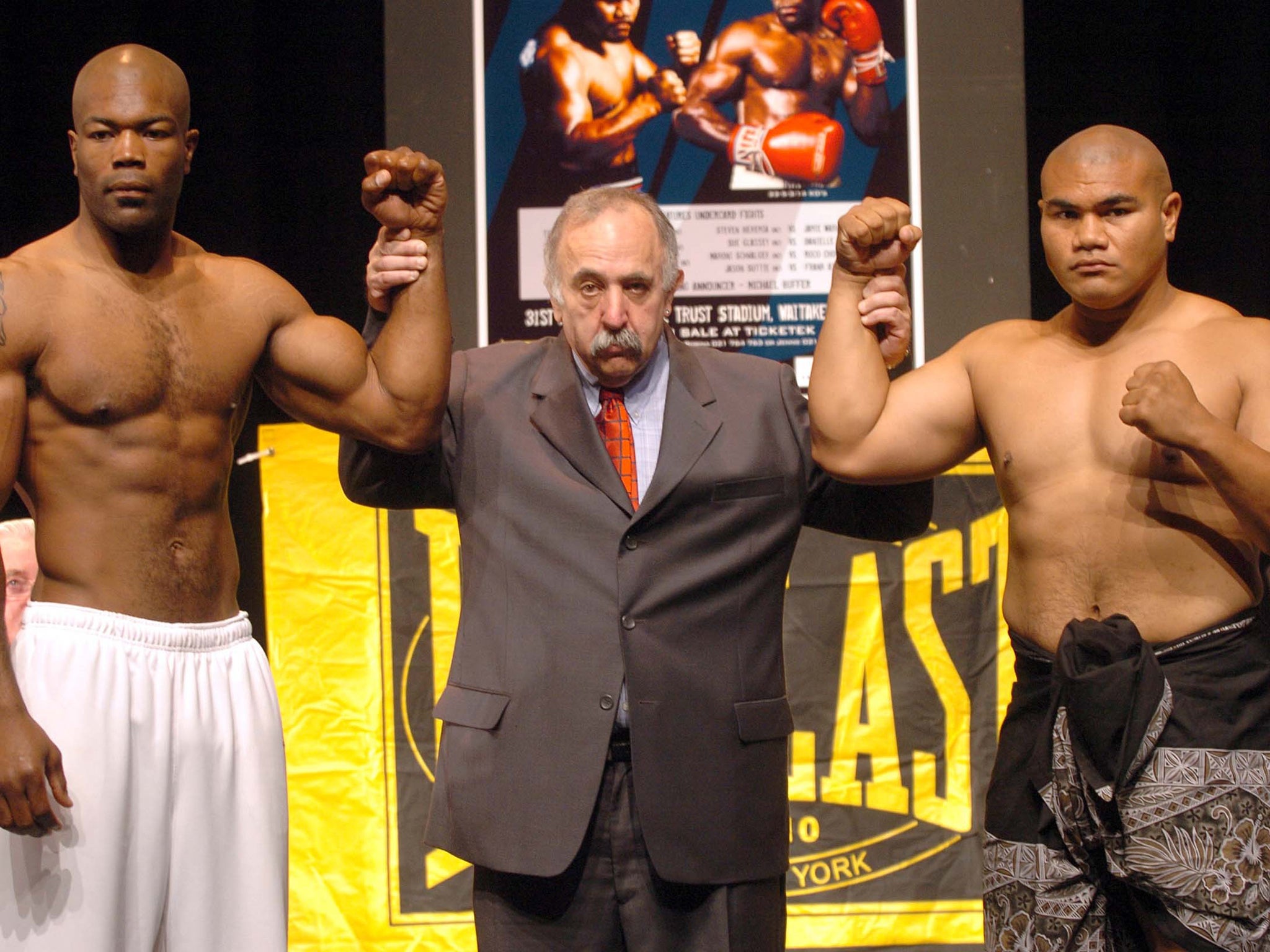Cedric Kushner: Colourful businessman who made his way in the music industry before successfully turning to boxing promotion
At one point Kushner had millions, 10 homes, more than 20 cars and an encyclopaedic knowledge of brothels in just about every country in the world

Cedric Kushner was once a big man in the boxing business, promoting elite world title fights and hitting the scales at just shy of 400 pounds before an operation in 2003 helped him lose weight. He was born in South Africa and, according to most of the tales he told, he worked his passage on a ship to Europe in the early 1970s when he was about 24. Kushner, you see, loved to tell stories – and most of them were true, which is not uncommon in the boxing world.
He was a ticket tout at the Munich Olympics and was, according to one tale, spotted by an American entrepreneur who invited him to continue his travels and work in America. Kushner did travel further and worked in Miami, doing odd jobs at various hotels and developing his love for the music business – but not before hard times forced him to clean swimming pools to make a living. There is a suggestion that he shined shoes at the fabulous but faded Fontainebleau hotel on Miami Beach, but that seems a stretch even for Cedric.
Kushner had a distinctive voice and a cultivated, glorious walrus-like moustache and with his spreading girth was both impressive and unforgettable. He managed to become a leading music promoter and he did promote the very best performers. At one point Kushner had millions, 10 homes, more than 20 cars and an encyclopaedic knowledge of brothels in just about every country in the world. His close friend of 25 years, boxing executive Lou DiBella, admitted that Kushner had "a penchant for the dark side."
"Big Ced", "Uncle Ced" – or, when he was at his most obese, "the Fat Man" – told tales slowly, enjoying the anticipation as he shared bits and pieces of his life with the Grateful Dead, the Rolling Stones and just about every other leading music act in the 1970s and '80s. However, it was his life in boxing, starting in 1984, which made him famous; it was both excessive and, briefly, fantastically successful.
In 1990 Kushner introduced a syndicated night of boxing, "Heavyweight Explosion", and a lot of top contenders were forced to take real fights when they appeared on his promotions. The nights were often terrific to watch and featured future world heavyweight champions Chris Byrd, Shannon Briggs, Oleg Maskaev, Hasim Rahman and Corrie Sanders.
Kushner was also a terrific survivor and admitted in court in the 1990s that he had made payments to the International Boxing Federation, one of the three main sanctioning bodies in boxing, to guarantee higher rankings for his boxers. His evidence came at the trial of the IBF's founder, Robert Lee, who was charged with racketeering and bribery after an investigation by the FBI. There is a fantastic piece of film, made by the FBI, of the IBF's chairman of ratings, Doug Beavers, taking off his shoe and pulling money from his sock to hand over to Lee.
"Life isn't fair and boxing rarely is," said Kushner, who also admitted to paying the IBF $100,000 in 1995 to order a rematch between their heavyweight champion at the time, George Foreman, and Kushner's fighter, Axel Schulz. "I have no idea if the money was in his sock – he would have needed a large pair," Kushner said.
He walked free from the scandal and continued to promote and work with boxers without prejudice. In 2000 Kushner's rehabilitation was complete and he was involved with Shane Mosley, arguably the world's finest fighter at the time, having just beaten Oscar De La Hoya, the sport's cash cow.
In 2001 Kushner triumphantly returned to South Africa with his fighter Rahman, a "Heavyweight Explosion" veteran, for a world heavyweight title fight against the champion, Lennox Lewis. It was a massive event and Big Ced was one of the first in the ring to celebrate when Rahman knocked out Lewis in the fifth round. The following day he dined with Nelson Mandela.
The joy never lasted long, and Rahman was more perceptive to a bag of cash, delivered by Don King and rumoured to contain $500,000, than agreeing a new contract with Kushner. The case came to the Supreme Court; Rahman won the right to walk away but Kushner was guaranteed a percentage of the boxer's fee from the rematch; Lewis returned the brutal favour and knocked Rahman cold. "I lost millions and so did Rahman," admitted Kushner. It was the start of the end at the top for Kushner and by 2003 Mosley was gone, the gastric band was fitted in the April of that year and Kushner, who died of a heart attack, started to fade away from boxing's limelight.
"This is how the boxing business works," he said in 2008: "the television guys want King Kong to fight Godzilla, the manager wants his boxer to fight Humpty Dumpty, and as the promoter I'm somewhere in the middle." Cedric Kushner was very good at being in the middle.
STEVE BUNCE
Cedric Kushner, boxing and music promoter: born South Africa 18 July 1948; died New York 29 January 2015.
Subscribe to Independent Premium to bookmark this article
Want to bookmark your favourite articles and stories to read or reference later? Start your Independent Premium subscription today.

Join our commenting forum
Join thought-provoking conversations, follow other Independent readers and see their replies